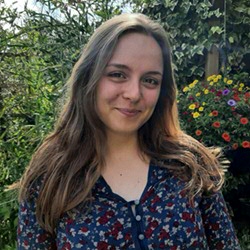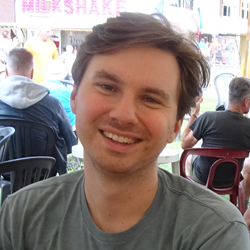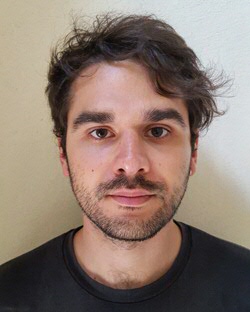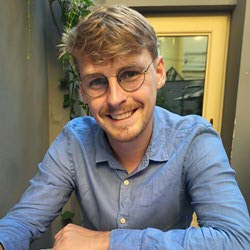ICOG welcomes five new PhD candidates
This month, five PhD candidates are beginning their research projects at ICOG. It is our pleasure to welcome them to ICOG, and to introduce them to you.
Alina Achenbach

Alina Achenbach joins ICOG after having obtained her Research Master’s Degree in Philosophy from KU Leuven, Belgium. Before that, she studied philosophy, anthropology, decolonial social theory, and IR as part of the Liberal Arts and Sciences program at University College Roosevelt (Middelburg/Utrecht University).
In her research, she works at the intersection of philosophy of technology, critical border & migration studies, and the biopolitics of mobility/immobilization. She is especially interested in the nexus between knowledge production and violence; and her research so far has focused on how Eurocentric and (neo)colonial power-structures pervade structures of knowledge production, politics of memory and technology/modernity critique. She has been published in Philosophy Today, Kohl: a Journal for Body and Gender Research, and Ricoeur Studies and is exploring collaborative and collective notions of authorship.
At ICOG, she is joining CIRR's History and Theory of International Relations research team with a proposal on migration as form and enactment of knowledge and simultaneous resistance. She is looking at (especially Arabophone) forms of migrant activism and political organization in the context of forced migration in the Mediterranean borderscape, where both the socio-cultural entanglement of the ‘Europe’ and its outside as well as violent materialities of bordering are taking place.
Next to her research, she volunteers as translator and is very interested in multilingualism and language learning.
Kai Hopen

Kai is a graduate of the UG's BA in English Language and Culture, and its research MA in Arts, Media, and Literary Studies. After finishing these programs, he taught in the UG's BA in American Studies for a year, and spent a lot of time working to develop the PhD project that starts this fall.
That project is on "The MacArthur Fellowships and the Making of Contemporary American Literature." The project will study recipients of these MacArthur Fellowships, better known as the 'Genius Grants,' because these awards are a significant actor in the formation of a contemporary literary canon in the U.S., and because they have developed over the past forty years into an important institution of American liberalism.
The project is particularly interested in the crises of democracy, of the policing of race, gender, and sexuality, and of economy, that have bloomed the past decade or so in the U.S., and in how the Fellowship and the literary work it awards mediate these crises.
Daniel Leix Palumbo

Daniel Leix Palumbo obtained a Research Master in Media Studies at the University of Amsterdam in 2020. He then started working as a Junior Lecturer in the BA programme of Media Studies at the University of Groningen. He also works as a music producer and sound designer, collaborating with cultural institutions like the Institute of Network Cultures, Museo Nacional del Prado, and Fondazione Palazzo Strozzi.
His PhD research project explores how the datafication of speech acoustics can be used for purposes of algorithmic profiling and control. The project examines the ways in which the German and Turkish immigration agencies use voice biometric technology in asylum procedures to determine the identity and country of origin of undocumented asylum seekers. It investigates the sound of voice as a new site to construct identities and control borders. The research is funded by the NWO grant PhD in the Humanities and is supervised by Prof. Dr Susan Aasman and Dr Robert Prey in collaboration with Dr Matt Coler from the MSc Voice Technology at Campus Fryslân.
Pim Schievink

Pim Schievink graduated from the Research Master Classical, Medieval and Early Modern Studies (CMEMS) in 2020, with a specialisation in ancient history.
Already during his Bachelor’s programme, he was fascinated by ancient Greek and Roman religion. During his Master’s, this resulted into a focus on the Greek temples of the god Asklepios. Asklepios is the Greek god of medicine and healing, whose sanctuaries were found all over the Greek world from the Hellenistic period (ca. 323-30 BC) onwards. These sanctuaries attracted a cross-section of society, from different places and with different motives. However, a narrow scholarly focus on their healing function, analysed through the major shrines, presents a monolithic view of these Asklepieia. Not everyone came for healing, not all Asklepieia were large centers, and not all sanctuaries were used or experienced in a similar way. Multiple roles, audiences and experiences co-existed and impacted the Asklepieia.
Pim’s NWO-funded research, "Creating complex sacred spaces: experience, agency and multivocality in Hellenistic Asklepieia (4th century BC – 1st century BC)," aims to understand the complexity of the sanctuaries of Asklepios across the different regions in mainland Greece and the Aegean Islands.
Joanna Zienkiewicz

Joanna Zienkiewicz is interested in researching popular music, politics, protest music, and identity, and has been a speaker at academic conferences in the Netherlands, Sweden, Germany, UK, and Serbia. To date, she has published two peer-reviewed journal articles on protest song (Sonic Scope) and online culture wars (Journal of Media and Culture M/C). She is additionally affiliated with the Polish Facta Ficta Research Centre for Cultural Studies as a journal editor and she is the current secretary of the International Association for the Study of Popular Music (IASPM) in the Benelux region.
Joanna Zienkiewicz is currently in the beginning stages of working on her NWO-funded doctoral thesis, entitled "Transcending the Divide: Contesting Authoritarian Populism in Protest Music" (2022-2026). This interdisciplinary project focuses on understanding anti-populism—which has, so far, been neglected in research—through studying protest music directed against authoritarian populists. By researching case studies of Poland’s contemporary protest music and its reception, Joanna studies various strategies used by the critics of populism and their effects.
| Last modified: | 07 September 2022 10.33 a.m. |
More news
-
16 April 2024
UG signs Barcelona Declaration on Open Research Information
In a significant stride toward advancing responsible research assessment and open science, the University of Groningen has officially signed the Barcelona Declaration on Open Research Information.
-
02 April 2024
Flying on wood dust
Every two weeks, UG Makers puts the spotlight on a researcher who has created something tangible, ranging from homemade measuring equipment for academic research to small or larger products that can change our daily lives. That is how UG...
-
18 March 2024
VentureLab North helps researchers to develop succesful startups
It has happened to many researchers. While working, you suddenly ask yourself: would this not be incredibly useful for people outside of my own research discipline? There are many ways to share the results of your research. For example, think of a...
